Dagstuhl-Seminar 19481
Composing Model-Based Analysis Tools
( 24. Nov – 29. Nov, 2019 )
Permalink
Organisatoren
- Francisco Durán (University of Málaga, ES)
- Robert Heinrich (KIT - Karlsruhe, DE)
- Diego Perez-Palacin (Linnaeus University - Växjö, SE)
- Carolyn L. Talcott (SRI - Menlo Park, US)
- Steffen Zschaler (King's College London, GB)
Kontakt
- Michael Gerke (für wissenschaftliche Fragen)
- Annette Beyer (für administrative Fragen)
Impacts
- Composing Model-Based Analysis Tools - Heinrich, Robert; Duran, Francisco; Talcott, Carolyn L.; Zschaler, Steffen - Berlin : Springer, 2021. - XVI, 307 S.. ISBN: 978-3-030-81914-9 / 3-030-81914-0.
- Compositional model analysis : article - Gray, Jeff; Rumpe, Bernhard - Berlin : Springer, 2020. - pp. 261-262 - (Software and systems modeling ; 19. 2020, 2).
Programm
Quality properties like performance and dependability are key for today’s systems. Several techniques have been developed to effectively model quality properties, which allow analyzing these systems. However, the very different nature of these properties has led to the use of different techniques and mostly independent tools. In addition, different tools and techniques can be used for modelling quality depending on the size and complexity of the systems and the available details. For example, for modeling dependability techniques like Fault Trees, Markov Chains, and Reliability Block Diagrams are available. Similarly, a range of analysis techniques are available, including simulations, using numerical, analytical or graphical techniques, and analytical methods.
Although it is worth exploring other techniques and methodologies, model-driven engineering (MDE) seems a promising technique to efficiently design and reason about behavior and quality of systems in various domains. Indeed, it has been very successfully applied to improve the efficiency of software development and analysis in various domains.
Moreover, recent innovations, like the Internet of Things, production automation, and cyber physical systems, combine several domains such as software, electronics and mechanics. Consequently, also the analyses for each of these individual domains need to be combined to predictively analyze the overall behavior and quality. The composition of systems and their analyses is a challenging but unavoidable issue for today’s complex systems. Existing (MDE) approaches to modeling and analysis are not sufficient to compose modular analyses combining domain-specific languages. First attempts towards composable modular models have been developed in recent years, attempting to compose, not only the structure of models and domain specific modeling languages (DSMLs), but also their dynamic aspects (behavior and semantics). These indeed may be good foundations for building composable modular analyses. However, much work remains ahead.
In this Dagstuhl Seminar, we target more flexibility in MDE by discussing how to modularize and compose models and analyses. This provokes questions from the theoretical computer science and formal methods community — for example, on validity, uncertainties, behavior and property protection/preservation/reflection, and termination of analyses. Traditionally, research on these topics is conducted in the formal methods community isolated from the MDE community.
A key objective for bringing together representatives from industry and researchers in the formal methods and software engineering communities is to make progress towards establishing the foundations for a common understanding. Specifically, the main goals of the seminar are:
- Build a joint community on modular modeling and analysis.
- Identify and discuss commonalities and differences to address fundamental questions and elaborate the basic concepts on modular modeling and analysis.
- Create joint publications that summarize the state of the art, discussions of commonalities and differences, fundamental concepts, and identify potential for future research activities.
 Francisco Durán, Robert Heinrich, Diego Pérez-Palacín, Carolyn L. Talcott, and Steffen Zschaler
Francisco Durán, Robert Heinrich, Diego Pérez-Palacín, Carolyn L. Talcott, and Steffen Zschaler
Quality properties like performance and dependability are key for today's systems. Several techniques have been developed to effectively model quality properties, which allow analyzing these systems. However, the very different nature of these properties has led to the use of different techniques and mostly independent tools. In addition, different tools and techniques can be used for modelling quality depending on the size and complexity of the systems and the available details. For example, for modeling dependability techniques like Fault Trees, Markov Chains, and Reliability Block Diagrams are available. Similarly, a range of analysis techniques are available, including simulations, using numerical, analytical or graphical techniques, and analytical methods.
Although it is worth exploring other techniques and methodologies, model-driven engineering (MDE) seems a promising technique to efficiently design and reason about behavior and quality of systems in various domains. Indeed, it has been very successfully applied to improve the efficiency of software development and analysis in various domains.
Moreover, recent innovations, like the Internet of Things, production automation, and cyber-physical systems, combine several domains such as software, electronics and mechanics. Consequently, also the analyses for each of these individual domains need to be combined to predictively analyze the overall behavior and quality. The composition of systems and their analyses is a challenging but unavoidable issue for today's complex systems. Existing MDE approaches to modeling and analysis are not sufficient to compose modular analyses combining domain-specific languages. First attempts towards composable modular models have been developed in recent years, attempting to compose, not only the structure of models and domain specific modeling languages (DSMLs), but also their dynamic aspects (behavior and semantics). These indeed may be good foundations for building composable modular analyses. However, much work remains ahead.
In this Dagstuhl Seminar, we target more flexibility in MDE by discussing how to modularize and compose models and analyses. This provokes questions from the theoretical computer science and formal methods community for example, on validity, uncertainties, behavior and property protection/preservation/reflection, and termination of analyses. Traditionally, research on these topics is conducted in the formal methods community isolated from the MDE community. A key objective for bringing together representatives from industry and researchers in the formal methods and software engineering communities is to make progress towards establishing the foundations for a common understanding.
 Francisco Durán, Robert Heinrich, Diego Pérez-Palacín, Carolyn L. Talcott, and Steffen Zschaler
Francisco Durán, Robert Heinrich, Diego Pérez-Palacín, Carolyn L. Talcott, and Steffen Zschaler
- Sofia Ananieva (FZI - Karlsruhe, DE) [dblp]
- Kyungmin Bae (Postech - Pohang, KR) [dblp]
- Christel Baier (TU Dresden, DE) [dblp]
- Olivier Barais (IRISA - University of Rennes, FR) [dblp]
- Simona Bernardi (University of Zaragoza, ES) [dblp]
- Erwan Bousse (University of Nantes, FR) [dblp]
- Benoit Combemale (University of Toulouse, FR) [dblp]
- Juan De Lara (Autonomous University of Madrid, ES) [dblp]
- Francisco Durán (University of Málaga, ES) [dblp]
- Michalis Famelis (Université de Montréal, CA) [dblp]
- Martin Gogolla (Universität Bremen, DE) [dblp]
- Esther Guerra (Autonomous University of Madrid, ES) [dblp]
- Robert Heinrich (KIT - Karlsruhe, DE) [dblp]
- Mark Hills (East Carolina University - Greenville, US) [dblp]
- Jean-Marc Jézéquel (IRISA - University of Rennes, FR) [dblp]
- Kenneth Johnson (Auckland University of Technology, NZ) [dblp]
- Narges Khakpour (Linnaeus University - Växjö, SE) [dblp]
- Sandro Koch (KIT - Karlsruhe, DE)
- Raffaela Mirandola (Polytechnic University of Milan, IT) [dblp]
- Sam Owre (SRI - Menlo Park, US) [dblp]
- Diego Perez-Palacin (Linnaeus University - Växjö, SE) [dblp]
- Fiona A. C. Polack (Keele University - Straffordshire, GB) [dblp]
- Daniel Ratiu (Siemens AG - München, DE) [dblp]
- Arend Rensink (University of Twente, NL) [dblp]
- Ralf H. Reussner (FZI - Karlsruhe, DE) [dblp]
- Elvinia Riccobene (University of Milan, IT) [dblp]
- Bernhard Rumpe (RWTH Aachen, DE) [dblp]
- Houari Sahraoui (Université de Montréal, CA) [dblp]
- Patrizia Scandurra (University of Bergamo - Dalmine, IT) [dblp]
- Séverine Sentilles (Mälardalen University - Västerås, SE) [dblp]
- Marjan Sirjani (Mälardalen University - Västerås, SE) [dblp]
- Carolyn L. Talcott (SRI - Menlo Park, US) [dblp]
- Catia Trubiani (Gran Sasso Science Institute, IT) [dblp]
- Hans Vangheluwe (University of Antwerp, BE) [dblp]
- Dániel Varró (McGill University - Montreal, CA) [dblp]
- Arthur Vetter (KIT - Karlsruher Institut für Technologie, DE) [dblp]
- Markus Völter (Völter Ingenieurbüro - Stuttgart, DE) [dblp]
- Marc Zeller (Siemens AG - München, DE) [dblp]
- Steffen Zschaler (King's College London, GB) [dblp]
Klassifikation
- modelling / simulation
- semantics / formal methods
- software engineering
Schlagworte
- Model-driven Engineering
- Metamodeling
- Analysis
- Modularization
- Composition

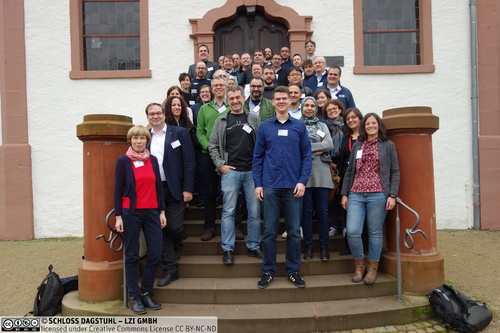
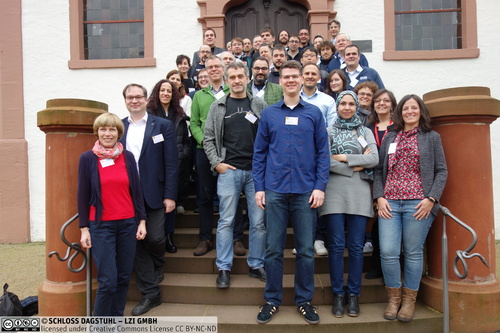
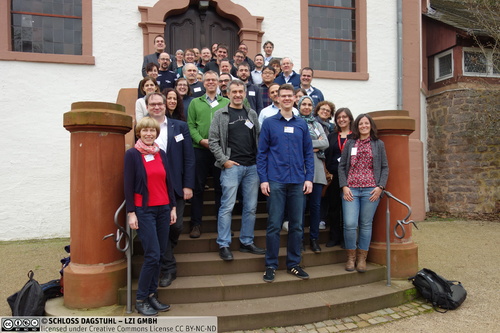
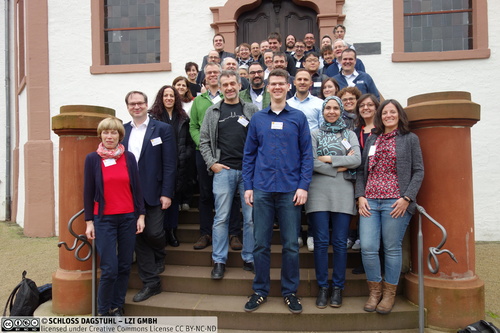
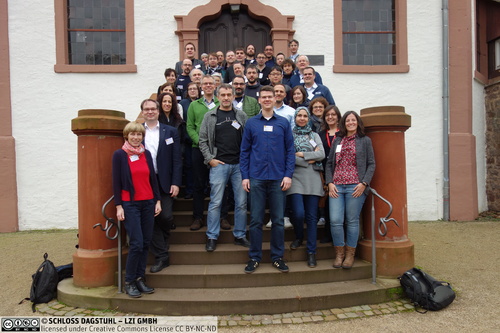
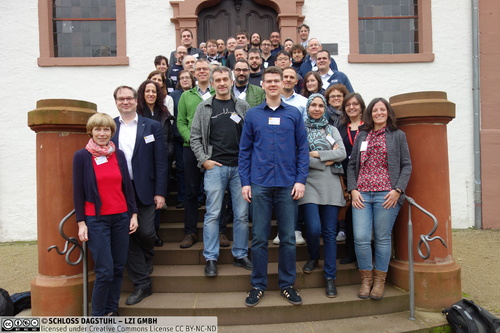
 Creative Commons BY 3.0 DE
Creative Commons BY 3.0 DE
